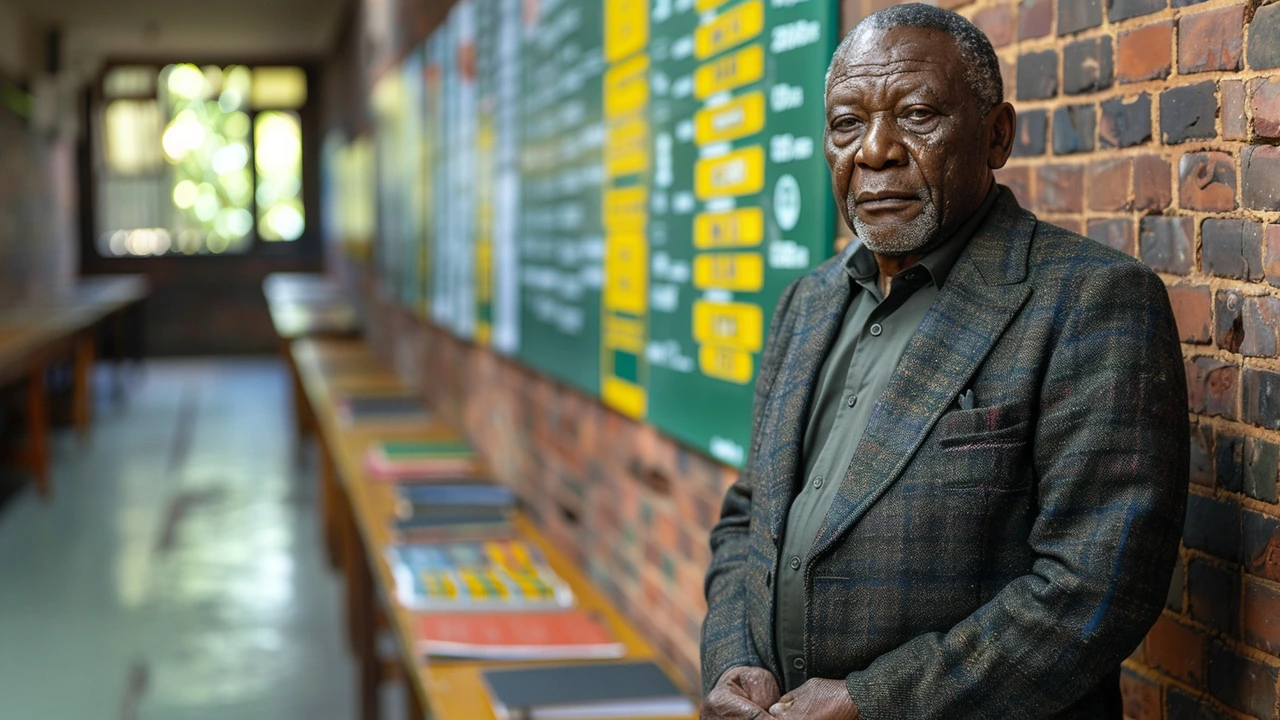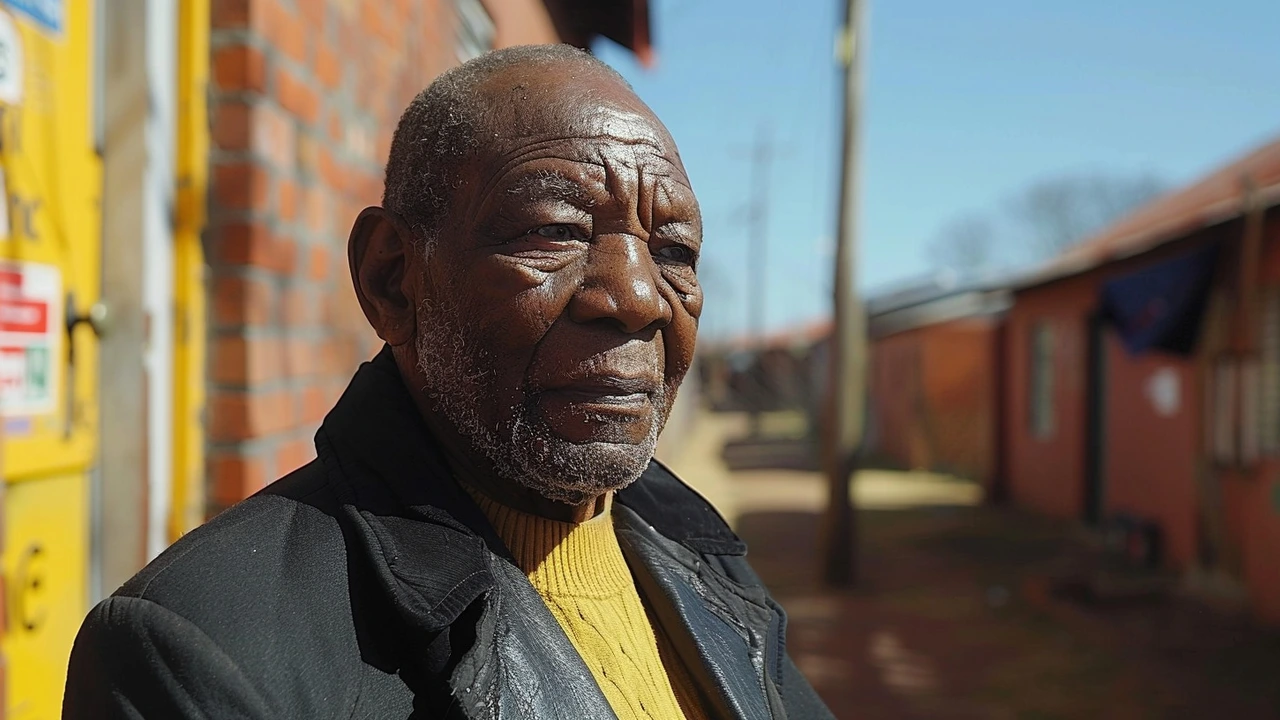South Africa's 2024 Elections: A Turning Point in Political Landscape
South Africa is on the cusp of a momentous occasion as it prepares to elect its seventh democratic Parliament. This election is unlike any other in the nation's recent history. The African National Congress (ANC), which has held the reins of power for the past 35 years, now faces the very real possibility of not securing a clear majority. This change could set the stage for a radical shift in how the country is governed, potentially marking the beginning of an era dominated by coalition governments.
Since the end of apartheid in 1994, the ANC has been the dominant force in South African politics. Their historical role in liberating the country from racial segregation has secured them a substantial following. However, as South Africans prepare to head to the polls in 2024, voting patterns suggest a decline in the ANC's dominance. Experts predict that while the ANC is likely to remain the largest single party in Parliament, its ability to govern without forming alliances is waning rapidly.
The Rise of Opposition Parties
The Democratic Alliance (DA), South Africa's main opposition party, is expected to retain its stronghold, particularly in the Western Cape. The DA has consistently championed policies promoting economic growth and good governance. Its sustained popularity in the Western Cape is no surprise, given they've effectively governed the province for several years.
Meanwhile, the Economic Freedom Fighters (EFF), a more radical left-wing party, has been making waves with its bold rhetoric and uncompromising stance on issues of land redistribution and economic justice. Despite these strong positions, there are signs that the EFF's support might be reaching a plateau. Similarly, the Inkatha Freedom Party (IFP), although maintaining a solid base, has struggled to expand its influence beyond certain regions.
Emergence of New Political Forces
A particularly intriguing development in this electoral cycle is the formation of a new party, uMkhonto weSizwe (MK), in December 2023. This new contender has gained notable attention, partly due to its endorsement by former President Jacob Zuma. The party, named after the armed wing of the ANC during the struggle against apartheid, promises to bring a fresh yet historically significant perspective to the table.
Speculation abounds that the MK might merge with the EFF, resulting in a formidable force in South African politics. If this happens, it could dramatically alter the political dynamics and force a reconsideration of how coalitions might form post-election. This potential alliance underscores the broader trend towards coalition politics, signaling a departure from single-party dominance.

The Challenge of Coalition Governments
South Africa's proportional representation electoral system naturally lends itself to coalition governments, especially in a fragmented political environment. As the ANC's grip weakens, the necessity for real, effective negotiations between various political entities increases. Coalition governments are not new to South Africa, but their prevalence and importance are set to grow.
The complexity of managing a coalition lies in balancing diverse and often contrasting ideologies. The upcoming government will need to prioritize unity, focusing on economic growth and sustainable development. While political alliances can be challenging, they also offer a broader representation of South Africa's diverse populace. Successful coalitions will require setting aside ideological differences, racial tensions, and historical divisions. The goal should be to create inclusive policies that uplift all sectors of society.
One essential area for any coalition government will be economic policy. South Africa's economy has been struggling with high unemployment rates, particularly among the youth. Stimulating economic growth through infrastructure projects, improving education systems, and incentivizing entrepreneurship will be crucial. Coalition governments must also address systemic issues such as corruption and inadequate public services, which have plagued the country for years.
Focus on Unity and Development
The new administration's overarching mission should involve uniting the nation under a common vision for the future. This vision must encompass economic prosperity, social justice, and the eradication of corruption. In a country as diverse as South Africa, achieving harmony among different ethnic and social groups is vital. Efforts should be made to foster a sense of national identity and pride that transcends historical grievances.
South Africa’s political landscape is undeniably shifting. The 2024 elections will likely mark the beginning of a more collaborative and inclusive approach to governance. While this transition period may come with its share of challenges, it also brings opportunities for growth and renewal.
As South Africans prepare to cast their votes, they are not merely electing representatives for Parliament—they are shaping the future of their country. The move towards coalition government represents a stepping stone towards more representative governance. By embracing this change, South Africa has the chance to forge a path that honors its complex history while looking forward to a brighter and more unified future.






Terrell Mack
May 28, 2024 AT 19:10Looks like South Africa might finally see a coalition shake‑up.
Dawn Waller
May 29, 2024 AT 22:57Wow!!! So the ANC finally got a reality check????!! Who would have guessed that a party could lose its grip after 35 years??? It's like watching a slow‑motion train crash-only the train’s name is "Freedom" and the tracks are made of voter fatigue!!! lol!!!
Grace Melville
May 31, 2024 AT 02:43Great overview. The shift toward coalition could bring fresh perspectives 😊.
Ashlynn Barbery
June 1, 2024 AT 06:30Indeed, the prospect of a coalition demands a measured approach. It is essential that all parties prioritize national development over partisan gain. By fostering inclusive dialogue, South Africa can navigate this transition with stability and optimism.
Sarah Graham
June 2, 2024 AT 10:17Absolutely. I hope every faction remembers that collaboration is the key to serving the broader citizenry.
Jauregui Genoveva
June 3, 2024 AT 14:03Morality matters more than ever-let's not forget the human cost of corruption 🚨. Parties must act with integrity, or they betray the very people they claim to represent.
naman sharma
June 4, 2024 AT 17:50One must consider that shadow networks may influence coalition outcomes in ways not disclosed to the electorate. The intricate tapestry of power often hides strings that bind parties to external interests, which may be orchestrated by long‑standing elites seeking to preserve their dominion.
Quinten Squires
June 5, 2024 AT 21:37The election is a turning point many have forecasted it will reshape the political arena the data points to a fragmented parliament and the need for negotiations will be paramount parties must compromise and work together.
Tyler Manning
June 7, 2024 AT 01:23While enthusiasm is commendable, it is imperative to scrutinize the competence of each coalition partner. The nation cannot afford to be steered by inexperienced or extremist elements, lest we regress.
james patel
June 8, 2024 AT 05:10From a governance‑structural perspective, the emergence of a multi‑party coalition necessitates robust policy‑integration frameworks. Leveraging cross‑sectoral synergies will mitigate jurisdictional redundancies and enhance legislative efficacy.
Scarlett Mirage
June 9, 2024 AT 08:57It is a curious contemplation that history repeats itself not merely as a mirror but as a canvas upon which new actors paint fresh narratives!!! The ANC's waning dominance heralds a tectonic shift that could recalibrate the nation's political equilibrium!!! One might argue that the rise of parties such as the DA and the EFF reflects a maturation of democratic pluralism, yet the specter of fragmentation looms large!!! In the crucible of coalition politics, compromise becomes both virtue and necessity, a paradoxical dance of idealism and pragmatism!!! The very fabric of governance will be tested, as divergent ideologies vie for legislative legitimacy while simultaneously seeking common ground!!! Moreover, the nascent MK party, with its historical nomenclature, injects a symbolic dimension that could either galvanize disenfranchised constituents or exacerbate polarizing narratives!!! Should MK align with the EFF, the resultant bloc might wield considerable leverage, compelling the ANC to negotiate earnestly rather than dictate terms!!! However, such an alliance also risks alienating moderate voters who fear radical policy overhauls!!! The coalition equation, therefore, extends beyond mere seat tallies; it encompasses the intricate calculus of policy portfolios, ministerial appointments, and the allocation of resources!!! Economic imperatives, especially the chronic unemployment crisis, demand a cohesive strategy that transcends partisan red lines!!! Failure to coalesce around a unified growth agenda could entrench stagnation, undermining public confidence in democratic institutions!!! Conversely, a well‑orchestrated coalition could spearhead reforms in education, infrastructure, and anti‑corruption measures, revitalizing the nation's trajectory!!! The onus, thus, rests on political actors to eschew zero‑sum mentalities and embrace a collaborative ethos, lest the electorate's aspirations be diluted by incessant bickering!!! In sum, South Africa stands at a crossroads where the path chosen will sculpt its democratic vitality for generations to come!!!
Ian Sepp
June 10, 2024 AT 12:43In light of the forthcoming electoral outcomes, it is prudent to maintain a measured and respectful discourse.
Sweta Agarwal
June 11, 2024 AT 16:30Oh great, another coalition drama-just what we needed to keep the news cycle interesting.
Henry Cohen
June 12, 2024 AT 20:17We cant ignore the fact that theres a lot of hidden agendas in play its obvious the mainstream media wont tell u the whole story
Mark Langdon
June 14, 2024 AT 00:03Hey folks, I feel the vibe here is hopeful! Let’s keep the conversation constructive and support each other as South Africa navigates this new chapter.